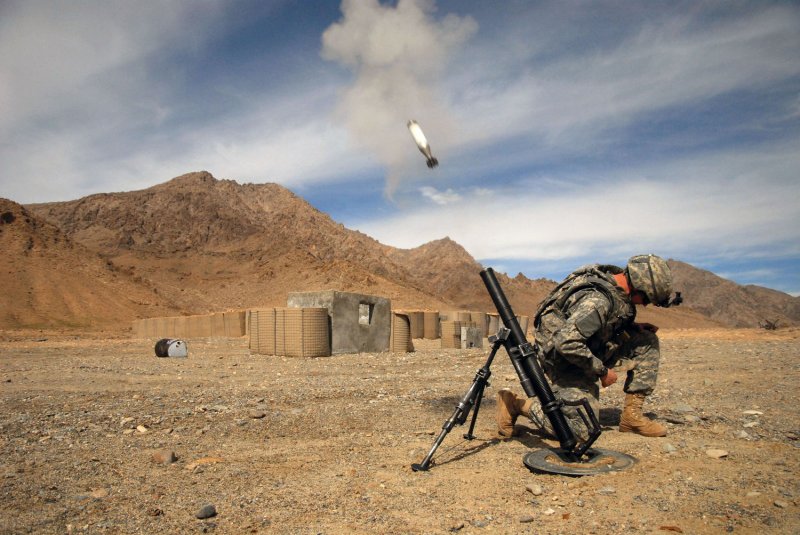U.S. Army Pvt. Jeffery Hansen crouches down after launching a 60mm mortar round on a range at Forward Operating Base Lane in Afghanistan on Feb. 15, 2009. Hansen is assigned to Bravo Company, 1st Battalion, 4th Infantry Regiment. (DoD photo by Staff Sgt. Adam Mancini, U.S. Army.) |
License Photo
WASHINGTON, Feb. 18 (UPI) -- President Obama's decision to deploy an additional 17,000 troops to Afghanistan is the first concrete sign of his administration's much heralded determination to switch the focus of the war on terror he inherited from Iraq to Afghanistan.
But unless it is combined with important changes in U.S. strategy and tactics -- most crucially, a scaling back of U.S. objectives, a renewed focus on building Afghan government capabilities and an effort to address insurgent safe havens in Pakistan -- success in Afghanistan is likely to remain elusive.
An 8,000-strong Marine Expeditionary Brigade will be deployed from Camp Lejeune, N.C., in late spring, and a 4,000-strong Army Stryker Brigade will follow them in late summer, the Pentagon said in a statement. An additional 5,000 support troops "will receive deployment orders at a later date," the statement added.
The deployment comes in response to a long outstanding request for additional forces from the U.S. commander on the ground, Gen. David McKiernan, Obama said yesterday. The troops are needed "to stabilize a deteriorating situation in Afghanistan, which has not received the strategic attention, direction and resources it urgently requires," Obama added.
The deployment "meets urgent security needs: an anticipated rise in violence during the traditional fighting season in the spring" and the need to improve security ahead of the national elections scheduled for Aug. 20, "to help ensure a healthy and representative … turnout," Pentagon spokesman Geoff Morrell told United Press International.
The troops will be deployed in the south of the country "by the commander on the ground … as he sees fit," Morrell added.
The deployment comes ahead of the conclusion of a broad strategic review of U.S. policy in the region, ordered by Obama and headed by Bruce Riedel of his national security staff. The review, which will encompass the results of a parallel effort by U.S. CENTCOM Commander Gen. David Petraeus, is expected to be completed ahead of the NATO 60th anniversary summit in April.
The deployment "will give us the flexibility to allow the review to go ahead. It does not predetermine any outcome. The review could recommend the deployment of additional forces," a senior administration official authorized to speak to the media told UPI.
Morrell said that McKiernan had requested an additional four brigades -- a doubling of the 30,000 U.S. troops that were in the country last year.
He said that about 3,500 troops, the third combat brigade of the 10th Mountain Division authorized by the previous administration, had arrived this month, and that a combat air brigade would be deployed in May. Together with the two brigades authorized Tuesday by Obama, "this will likely total more than 30,000," Morrell said.
But experts caution that even 60,000 troops may not be enough to bring security to the lawless areas of the Texas-sized country, which encompasses some of the wildest and most inhospitable terrain on the planet and whose fiercely independent tribes have a martial tradition that has made them unconquerable; 2009 will be "a tough year," McKiernan acknowledged at a news briefing at the Pentagon Wednesday.
"Americans are justifiably reluctant to redouble efforts in Afghanistan," said a statement from the progressive National Security Network. "Afghan history, as well as fatigue from the Iraq War and the economic downturn, all argue against a U.S. presence that is massive and unlimited in time or scope."
The group said the review "must make a clear break with the past" and should "place direct responsibility for Afghanistan's future with its people and their government. It must clearly differentiate between many goals we might like to work toward in the long term and the relatively few foundational steps that the United States must take along with its allies to help Afghanistan in the short term," such as "stronger governance … greater trust in government … reduce(d) corruption, (and) an Afghan police force that protects citizens and enforces laws."
The senior administration official declined to pre-empt the review's conclusions but said it would give "consideration to the deployment of all elements of national power," including diplomacy and reconstruction aid.
The review will also be "looking at the assistance we need from our allies," the official added.
Germany has indicated it will deploy more forces to southern Afghanistan. Britain, too, is likely to deploy more later this year to join its 8,000 troops already there, after it pulls out most of the 4,000 forces it has in Basra, Iraq.
But Canada, a key member of the U.S.-led coalition, has said it wants all its troops out of combat by 2011.
"I think it's important for the Canadian Legislature and the people of Canada to get a sense that what they're doing is productive," Obama told the Canadian Broadcasting Co. in an interview Tuesday ahead of his forthcoming trip. "Obviously I'm going to be continuing to ask other countries to help think through how do we approach this very difficult problem."















